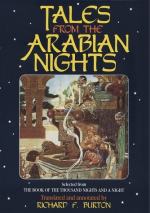Pharaoh, struck with astonishment at such heat of
tongue and valiancy of speech, arose from his seat
and stood facing Haykar and presently said, “Now
tell me that I may learn what thy lord resembleth and
what his Grandees represent.” The other
made reply, “My lord resembleth the God of Heaven,
and his lords represent the Lightning and Thunder.
An it be his will the winds do blow and the rains
do fall; and, when he deign order, the leven playeth
and the thunder roareth and at his behest the sun would
refuse light and the moon and stars stand still in
their several courses. But he may also command
the storm-wind to arise and downpours to deluge when
Naysan would be as one who beateth the bough[FN#69]
and who scattereth abroad the blooms of the chamomile.”
Pharaoh hearing these words wondered with extreme
wonderment, then raging with excessive rage he cried,
“O man, tell me the real truth and let me know
who thou art in very sooth.” “I am
Haykar,” quoth the other, “Chief Secretary
and especial to Sankharib the King; also his Wazir
and Councillor of his kingdom and Keeper of his secret.”
“Thou statest fact, O Sage,” quoth Pharaoh,
“and this thy say is veridical: yet have
we heard that Haykar is dead indeed, withal here art
thou alive and alert.” The Minister replied,
“Yea, verily that was the case, but Alhamdolillah—Glory
to God, who knoweth all hidden things, my master had
in very deed doomed me die believing the reports of
certain traitors, but my Lord preserved me and well
done to him who relieth upon the Almighty!”
Then quoth Pharaoh, “Go forth and on the morrow
do thou return hither and say me somewhat no man hath
ever heard, nor I nor my Grandees nor any of the folk
in my kingdom and my capital.” Accordingly
Haykar hied him home and penned a paper wherein he
said as follows: “From Sankharib, King
of Assyria and Naynawah, to Pharaoh King of Misraim:—Peace
be upon thee, O my brother! As well thou wottest,
brother needeth brother and the Kings require the
aidance of other Kings and my hope from thee is that
thou wilt lend[FN#70] me the loan of nine hundred-weight[FN#71]
of gold which I require to expend on the pay and allowances
due to certain of my soldiery wherewith to provide
for them the necessaries of life.” After
this he folded the writ and despatched it by a messenger
on the next day to Pharaoh, who perused it and was
perplext and exclaimed, “Verily and indeed never
till now have I heard a saying like unto this at all,
nor hath anyone ever spoken[FN#72] to me after such
fashion!” Haykar replied, “’Tis fact,
and ’tis well an thou own thee debtor of such
sum to my lord the King.” Pharaoh accepted
this resolving of his proposition and said, “O
Haykar, ’tis the like of thee who suiteth the
service of the Kings, and blessed be Allah who perfected
thee in wisdom and adorned thee with philosophy[FN#73]
and knowledge. And now remaineth to us only one
need of thee; to wit, that thou build us a bower between
firmament and terra firma.” Haykar replied,




